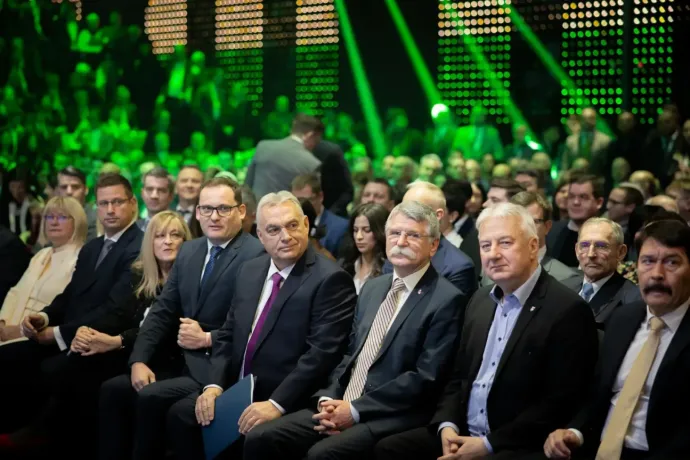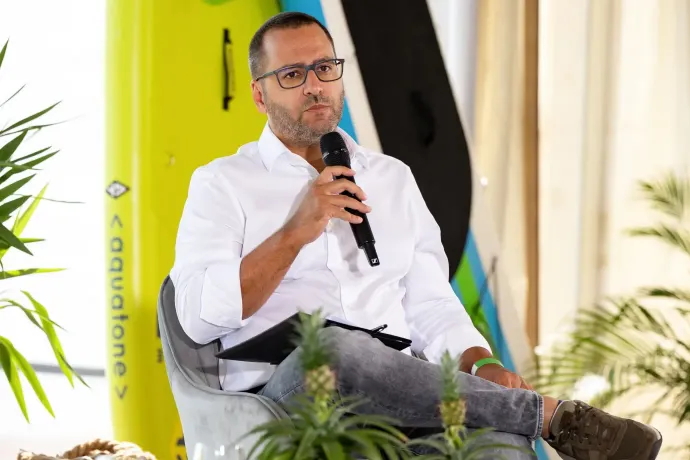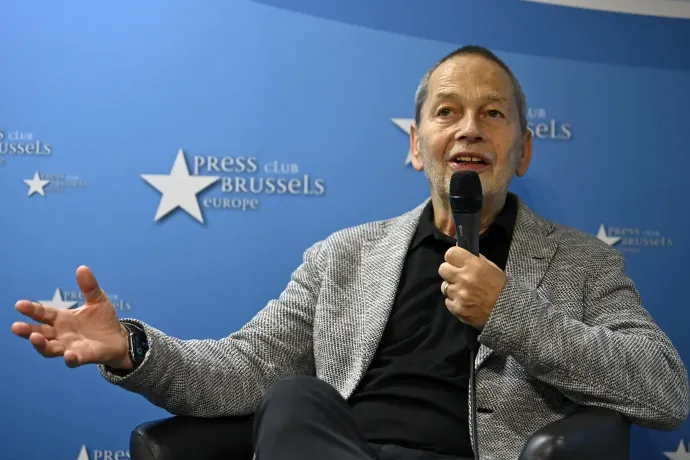Anyone funded from abroad should not deal with public affairs! – how the Hungarian government is going after NGOs it doesn't like

"There exists a grey area which is beyond the sphere of politics, but does not quite reach the realm of the secret services" – this is how Tamás Lánczi, President of the Sovereignty Protection Office (SPO), defined the place of the organisation he heads in a recent interview with Inforádió.
This description is a good illustration of what the Hungarian government has been doing for some time in the name of sovereignty protection: it identifies enemies against whom the government has already been conducting a grey-area warfare. These targeted actors are operating legally, paying taxes, not committing crimes, but for some reason their activities are an eyesore for the government. Since the authorities are unable to get rid of them either by legal means or through the secret services, and because they are neither spies nor a threat to the constitutional order, but merely a political threat to the government, the only means of dealing with them is to stigmatise them, using trumped-up, obscure terminology.
The reason why these actors have been declared enemies can be traced back to a single thing: their activities are financed, or have been financed, in part by foreign contributors, and the government is convinced that this is done in order to exert pressure on the Hungarian state and influence government policy. And according to the Hungarian government, there are two places in the world where, – to borrow Viktor Orbán's phrase from Star Wars – the people of the 'empire' have been sitting or are sitting: Washington and Brussels.
The mysterious “network”
This is not the first time that the Orbán government has expressed its displeasure with foreign-funded NGOs, but the election of Donald Trump – who sympathises with illiberal forces – as president in the United States, has emboldened the Hungarian Prime Minister. In his annual State of the Nation address, he unambiguously declared war on the "network" which, in his view, is serving foreign interests instead of Hungarian ones, but is active in Hungary.
Orbán did not name this "network", but in his annual speech he even mentioned the participants of this alleged conspiracy: he said that there are journalists, judges and prosecutors, politicians, foundations, and even bureaucrats who are members of this " enormous apparatus that has been operating a dictatorship of liberal opinion and political repression throughout the Western world".
Orbán was obviously referring to those domestic and foreign actors critical of the Hungarian government's actions, who have disagreed with its illiberal approach in recent years and decades, and who have during that time received financial support for their activities from abroad, mainly from the US and the EU. In the Prime Minister's view, they were clearly serving foreign interests, the interests of 'the empire'.
In the address, Orbán promised that the government would do away with the "empire's Budapest depot" by Easter, but he did not explain what he meant by this. He only mentioned two specific points:
- Hungary will be sending a government commissioner to the United States to "gather all the evidence" about foreign subsidies that have flowed into Hungary;
- Following this, they would somehow – using the US Magnitsky Act as an example – sanction organisations using such funds, and would somehow shut off the money flow of the "Soros network".
Who and what would be sanctioned?
For the time being, there are more questions than answers. It is not clear, for example, exactly what Orbán means by "the Budapest depot of the empire". Is he referring to the Hungarian offices of international NGOs? Or just Hungarian NGOs? Newspapers and journalists independent of the government and Fidesz? And, of course, it is not clear what he means when he says that these "will be done away with". Will their operations be banned? Will they make it impossible for them to operate? Will they be prohibited from accepting subsidies from abroad? Will they be stigmatised or listed in some official or administrative way? Or will the government simply launch a communications offensive against them?
One reason why it is difficult to predict what might be coming is that government officials have been making contradictory statements on the matter. If they intend to crack down on the 'empire's Budapest depot' with legislation modelled after the US Magnitsky Act, it would in theory imply sanctions similar to those the US imposes on organisations or individuals which it considers to be a national security risk. This is the sanction measure that the Biden administration implemented against one of Viktor Orbán's most important ministers, Antán Rogán, for example.
However, this essentially applies to foreigners. The Magnitsky Act gives the US President the power to block or revoke visas of certain "foreign persons" (individuals and organisations) and to impose financial sanctions on them, such as freezing their bank accounts in the United States. This may be used against war criminals or people who are complicit in "significant acts of corruption" and therefore pose a national security risk to the US.
What exactly is political corruption?
It is already apparent that 'political corruption' has become the key word in government communications, as Fidesz politicians have started spouting it all the time. According to Fidesz's communication, the Hungarian actors who have accepted "rolling dollars", "rolling euros" (their term for foreign subsidies) and have also taken a stance on public affairs have all been involved in political corruption. According to the government's argument, these individuals and organizations accepted foreign funds in order to serve the interests of the Democratic Party-led USA and to exert influence on Hungarian public life and politics in matters deemed important by the Americans or the EU, contrary to "Hungarian interests".
"Political corruption" and "Hungarian interests" are two terms that cannot be precisely defined, but can only be interpreted in the political field. Although some foundations linked to Fidesz have also been recipients of foreign funding, the government is in a relatively easy position, because they are not even trying to hide the fact that it is up to them to decide what is and what is not in the Hungarian interest. As Fidesz Communications Director Tamás Menczer said in an interview with Telex, Fidesz has "always served the interests of Hungary". According to Fidesz politician Lajos Kósa, for example, Telex received foreign funding to train journalists willing to attack the government (The reality however is that Telex Academy offers an accredited training for teachers and strictly non-political courses on media theory and media literacy to high school students, who can also try their hand at making a newspaper. Additionally, we reported transparently on the successful US tender for this when the Academy was launched and in the transparency report that followed.)
Incidentally, the concept of "political corruption" has previously been defined by Transparency International, which under the Fidesz narrative is part of the "empire". According to their definition, political corruption is when "political decision-makers abuse their position, status and wealth to stay in power, illegally influencing policies, institutions and the allocation of public funds" – this clearly applies the term to politicians in positions of power and decision-making. Of course, according to the government's narrative, the NGOs are part of the same corrupt relationship, only they are the recipients, accepting money from (foreign) policy makers in order to carry out what they have been tasked to do.
It is hard to tell where this offensive might lead, partly because of the contradictory and non-specific statements made by Fidesz politicians, and also because it has not yet been translated into legislation, but has only been manifested in the government's communication, albeit in a coordinated manner.
Even if a 'Hungarian Magnitsky law' or something similar could be drafted along these lines, it is not clear what the sanctions might consist of. Given the emphasis in government communication on "cutting off the flow of money", it seems likely that blocking the arrival of funding from abroad could be an option, but it is unclear what legislative changes would be needed to achieve this.
What is public life?
In the interview mentioned above, Tamás Lánczi said that in his opinion, it would be right if Hungarian NGOs that engage in public affairs could not receive foreign funding. The reason he gave for this was that, in his view, an NGO that is engaged in political and public activities is like a political party, and political parties are not allowed to receive foreign funding either. According to Lánczi, it is fine for an NGO to make its voice heard on public issues, because there is freedom of opinion and expression, but it is not okay if it wants to have a say in public affairs while receiving funding from abroad.

This argument does not seem to be rock-solid either, as Lánczi was not able to clarify exactly based on what the Hungarian state would decide what is and what is not political pressure.
"Political pressure looks like political pressure, and it can be distinguished quite well from what is an otherwise genuinely civic activity."
– this is all the leader of the Sovereignty Protection Office said in response to this important question.
But the question is hardly nit-picking. Inforádió's reporter also raised the question of whether, for example, if a foreign-funded organisation is conducting a trash collection, but a deputy state secretary walks up to them during the collection to take a photo as part of his or her campaign, it would be considered as the NGO attempting to influence domestic politics.
In the interview, Lánczi explained that in his opinion, "an NGO wandering into the political arena and expressing a political opinion is not a problem", as long as there are "no foreign intentions, influence or money" behind it. "That's what constitutes a problem, because from then on it means that someone from outside is trying to manipulate the Hungarian public, Hungarian public opinion, Hungarian politics, those in power, whether at national or local level", the president of the SPO explained, although he still failed to clarify why an NGO should not have an influence on society and public life, especially because it is not in a decision-making position.
According to the interpretation of the head of the SPO, it is damaging for a country's sovereignty if someone receives support or knowledge from abroad and then, through their own organisation, takes a position shared by the donor, because in doing so they serve the interests of a foreign actor (a business circle or a state). According to Lánczi, this is the case even if the recipient already has the same position on a particular issue as the donor.
What can be gathered from the statements made by government politicians is that the targets would primarily be foreign-funded actors who take a position contrary to "Hungarian interests", for example on migration, war or gender issues.
Lánczi also indicated that the government does not only have a problem with funding from the US, but also with money from the EU if it is received by NGOs who are taking a stand on public affairs and political issues.
Going to Washington and Brussels
Although it is not yet clear what specific legislative changes can be expected, it is clear that the government is moving in two directions. On the one hand, a government envoy is being sent to the United States to find out what aid has been sent to Hungarian actors in recent years. And on the other hand, the Brussels branch of the Mathias Corvinus Collegium, fattened up by the government, the think-tank MCC Brussels is being activated.
MCC Brussels will be tasked with shedding light on how much money has flowed from the European Commission to Hungarian NGOs and think-tanks. According to MCC Brussels, this was done so that the Commission could reinforce its own policies while silencing any voices of dissent.
While the government is using the events surrounding USAID as an excuse to crack down on Hungarian actors critical of the government who have received support from the United States, in Brussels it is targeting the Green Deal payments, including the Citizens, Equality, Rights and Values (CERV) programme.
According to MCC Brussels, organisations that are financially dependent on the EU are playing a role in pushing the Commission's agenda as intermediaries. In exchange for financial support, they provide political propaganda, thus blurring the boundaries between independent civic society and institutional propaganda.

If we accept the claims of MCC Brussels as true, then the government's problem is that in Brussels they are doing the same thing the Hungarian government is doing at home: in recent years the Hungarian government has generously supported NGOs which are politically to its liking, only to have them take the same position in public as the government.
An ideological war
“The EU has amassed an extraordinary propaganda network of NGOs and compliant media, paid for by EU taxpayers, often working directly against the wishes of European citizens. Given the scale of this EU-NGO propaganda complex, we need a body with the power and drive to expose the full scale of this ideological corruption, which is why we are calling for an EU DOGE” – Frank Füredi, Executive Director of MCC Brussels wrote in a statement.
The creation of an EU DOGE was inspired by the Trump administration. After Donald Trump's victory, tech billionaire Elon Musk, who donated more than $290 million towards Trump's presidential campaign, was quickly given the opportunity to start streamlining the federal government as an advisor at the helm of a department called DOGE (Department of Government Efficiency). Before the media had had a chance to come to, Musk's men had already taken control of a series of government agencies whose names Americans had never even heard of, demanding and receiving access to sensitive government systems, in several instances by using force and threats to remove professionals who insisted on adherence to security measures.
Although the Orbán government is activating itself in both Brussels and Washington, it is entirely plausible that the harassment of NGOs and the press critical of the government, and the government's 'fact-finding', is nothing more than a political circus with two political objectives.The first is that by using the image of an enemy, Fidesz can consolidate its core voters, allowing it to set the theme for domestic politics while also redefining political corruption. The other is to force Orbán's challenger, Péter Magyar, to take a stand. If the Tisza Party president stands up for the NGOs under attack, Fidesz can once again claim that he is a man of the "empire". But if he does not stand up for the NGOs, he may lose the sympathy of those who care about the values they represent.
For more quick, accurate and impartial news from and about Hungary, subscribe to the Telex English newsletter!